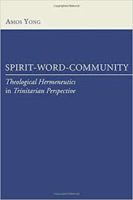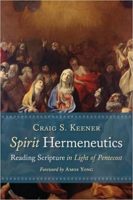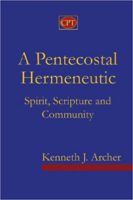 Following up on my recent review of Archer's study on Pentecostal hermeneutics, I picked up another gem, namely Yong's exercise in pneumatological hermeneutics. It is a different kind of book, as we shall see. The busy reader should jump over the long abstract right to my assessment below.
Following up on my recent review of Archer's study on Pentecostal hermeneutics, I picked up another gem, namely Yong's exercise in pneumatological hermeneutics. It is a different kind of book, as we shall see. The busy reader should jump over the long abstract right to my assessment below.
I was at the 10th Glopent conference
It's been over a month since I flew to Amsterdam to attend the 10th Glopent conference. It was focused on “the future of Pentecostalism” as a global social phenomenon. Papers were usually attempting to describe highly diverse Pentecostal groups from different parts of the world. We've learned something about Nigerian Pentecostal ministries in Europe, Arab Pentecostals in Palestine, Pentecostals in India, Hillsong ministries in European context, etc. Jon Bialecki's keynote seemed to step out of this line, as he was discussing sociology of miracles and their meaning in Pentecostal communities, but even this was illustrated on John Wimber's Vineyard.
Spirit Hermeneutics: Reading Scripture in Light of Pentecost (book review)
 Craig S. Keener (born 1960) is professor of New Testament at Asbury Theological Seminary. He is well known for his lifelong and prolific writing career, which most notably includes titles such as Paul, Women & Wives (1992), The IVP Bible Background Commentary: New Testament, or Acts: An Exegetical Commentary, which appears to be the largest and the most elaborate commentary on a biblical book ever written. (I heard it counts over 5 × 10^^6^^ words. Yes, five million!) Keener's commentaries and other publications are usually accessible for wider audience and I have personally benefited from them on more than one occasion.
Craig S. Keener (born 1960) is professor of New Testament at Asbury Theological Seminary. He is well known for his lifelong and prolific writing career, which most notably includes titles such as Paul, Women & Wives (1992), The IVP Bible Background Commentary: New Testament, or Acts: An Exegetical Commentary, which appears to be the largest and the most elaborate commentary on a biblical book ever written. (I heard it counts over 5 × 10^^6^^ words. Yes, five million!) Keener's commentaries and other publications are usually accessible for wider audience and I have personally benefited from them on more than one occasion.
Importantly, Keener is a self-defined charismatic scholar, which always sparkled my further interest in his work. And by a sheer coincidence, Craig S. Keener was present in the Czech Republic as the main guest on four day pastoral retreat in September 26th to 29th.
When I learned about Keener's upcoming visit (at which I was present), it occured to me to read his latest book named Spirit Hermeneutics: Reading Scripture in the Light of Pentecost. And given that it is in the field of my possible doctoral studies, reading this book seemed simply mandatory.
Find my masters thesis on Academia.edu
 Go and see it! It's great! It's great again! I know that. You know that. Everybody knows that. It's huge! See the link here → https://www.academia.edu/…Hermeneutics
Go and see it! It's great! It's great again! I know that. You know that. Everybody knows that. It's huge! See the link here → https://www.academia.edu/…Hermeneutics
My thesis is finished, I’m back from the dead
The English part of this blog has witnessed to more than eight months of my uninterupted absence. With the Czech part, it was a little bit better – only five months. This silence was given by my involvement in master's thesis writing, which was accompanied by a number of difficulties, some of them almost insurmountable.
- I was loaded with responsibilities at the School of Missions and Theology probably more than ever.
- My second son (now 9 months old) joined my first son in giving me much joy and much headache.
- In the last four months of writing, the universe seemed not to be happy about me meeting the deadline. My wife got sick, kids got sick, I got sick and went to a surgery, our bedroom became uninhabitable, all kinds of people suddenly needed my assistance, … and I could continue.
A Pentecostal Hermeneutic: Spirit, Scripture and Community (book review)
 The present title is Kenneth Archer's PhD dissertation submitted at University of St. Andrews, Scotland. It has been first published in 2004 by T&T Clark and republished by CPT Press in 2009. One does not need to think twice about whether to read it or not, as it seems to be one of the best books on Pentecostal hermeneutics so far, perhaps seminal for the ongoing discussion. Archer is a seasoned pastor, Pentecostal educator, and scholar. He currently teaches at Southeastern University.
The present title is Kenneth Archer's PhD dissertation submitted at University of St. Andrews, Scotland. It has been first published in 2004 by T&T Clark and republished by CPT Press in 2009. One does not need to think twice about whether to read it or not, as it seems to be one of the best books on Pentecostal hermeneutics so far, perhaps seminal for the ongoing discussion. Archer is a seasoned pastor, Pentecostal educator, and scholar. He currently teaches at Southeastern University.
Crosshound was born: Receive newly indexed Crossref items to your feed reader
 It's been a while again since my last post and I do intend to catch up on it and to tell you where am I getting with my PhD application and proposal. But that's for another story.
It's been a while again since my last post and I do intend to catch up on it and to tell you where am I getting with my PhD application and proposal. But that's for another story.
I've been busy in the past few months doing some bibliographical research in the fields of Pentecostal studies, philosophical hermeneutics and biblical interpretation. It seemed to never end, loads of articles and books were threatening to bury me under an unceasing avalanche. Now after several months, I somehow managed to bite through it. However, now that I'm done with scrolling though TOCs and search results, I realized that my research will be growing obsolete with every second, because seconds are the approximate time frame in which new paper is published somewhere.
Flat Earth Frenzy
I was in a trolling mood several days ago, so when I stumbled upon a Facebook group of the “Flat Earth Society”::https://www.facebook.com/…/2205176794/, I immediatelly came up with a total trollish nonsense and sticked it on their wall. The outcome was much better than I expected and I feel compelled to share it with you.
The main reason for such an abundant harvest is that almost all the commenters seemed to believe that I actually mean it, which was either because they have no sense of humor, or that they've met someone who actually believed that the Earth is flat (e.g. here).
Because seriously… Does the Bible not teach that the Earth is flat? Well, not directly, but you could make a sigbificant case that biblical writers did live with that notion. Let us only consider Job 37,18, Ps 104:2, Is 40:22, Ez 7:2, Mt 4:8, 2Pt 3:5 and Rev 7:1. And do you know how many times does the Bible tell us that the Earth is a relativelly smaller ball orbiting around big ball of burning gas, which is only one among gazillions in gazillions of gallaxies? Not a single time.
The original thread is still available under this link, but you can read and laugh right here.
Some preliminary musings on my future doctoral studies
What made me think about doing a PhD?
 If you asked me four years ago (~2013) as a super young part-time assistant teacher if I want to pursue a PhD in biblical or theological studies, my answer would be highly irresolute. I did like what I'm doing as an assistant teacher and I did want to do more of that, but raising my qualification was something that seemed too expensive and time consuming. I got my first university degree in 2014 and while I did want to pursue masters, I wasn't all that eager to apply for it because it wasn't required on my current position (Czech law allows accredited institutions of our kind to hire people with no degree at all). I had my own books, my responsibilities, my relatively secure place in school administration. Why would I want to add more labor and toil to it?
If you asked me four years ago (~2013) as a super young part-time assistant teacher if I want to pursue a PhD in biblical or theological studies, my answer would be highly irresolute. I did like what I'm doing as an assistant teacher and I did want to do more of that, but raising my qualification was something that seemed too expensive and time consuming. I got my first university degree in 2014 and while I did want to pursue masters, I wasn't all that eager to apply for it because it wasn't required on my current position (Czech law allows accredited institutions of our kind to hire people with no degree at all). I had my own books, my responsibilities, my relatively secure place in school administration. Why would I want to add more labor and toil to it?
More Than a Half Way Through
As I mentioned earlier on this blog, this past semester has been enormously stressful. Labor ipse voluptas works well for me, but enough is enough. This labor was, on the other hand, rewarded by confirmed completion of the first part of my MTh program. This means that I should now be working on my thesis proposal. It also means that I'm done with courses. No more traveling to Brussels in the busiest time of my full time job and no more lectures. Not that I'd feel nostalgic, but in spite of my persistent intellectual willfulness, after those scattered 10 weeks of listening to professors, I feel kind of… “formed”. My views on certain matters in the fields of Bible and theology have changed over the past 2 years. I'm not really sure whether the school itself would like it. I'm pretty sure though that all of my 8 professors do bear responsibility for this development.